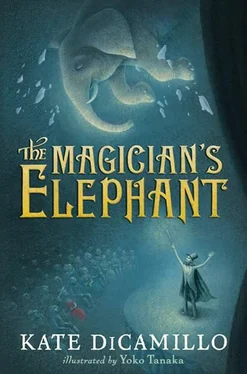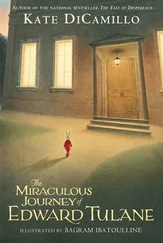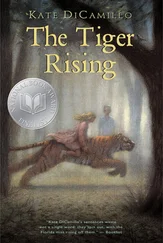“But how lovely,” said Sister Marie. “And what did you dream of?”
“The elephant.”
“Oh, elephant dreams, yes. I find elephant dreams particularly moving,” said Sister Marie, “and portentous, yes, although I am forced to admit that I myself have yet to dream of an elephant. But I wait and hope. One must wait and hope.”
“The elephant came here and knocked, and there was no one to answer the door,” said Adele.
“But that cannot be,” said Sister Marie. “I am always here.”
“And then, another night, I dreamed that you opened the door and the elephant was there, and she asked for me and you would not let her in.”
“Nonsense,” said Sister Marie. “I turn no one away.”
“You said you could not understand her.”
“I understand how to open a door,” said Sister Marie gently. “I did it for you.”
Adele sat down on the floor next to Sister Marie’s chair. She pulled her knees up to her chest. “What was I like then?” she said. “When I first came here to you.”
“Oh, so small, like a mote of dust. You were only a few hours old. You had just been born, you see.”
“Were you glad?” said Adele. “Were you glad that I came?” She knew the answer. But she asked anyway.
“I will tell you,” said Sister Marie, “that before you arrived, I was sitting here in this chair, alone, and the world was dark, very dark. And then suddenly you were in my arms, and I looked down at you…”
“And you said my name,” said Adele.
“Yes, I spoke your name.”
“And how did you know it? How did you know my name?”
“The midwife said that your mother, before she died, had insisted that you be called Adele. I knew your name, and I spoke it to you.”
“And I smiled,” said Adele.
“Yes,” said Sister Marie. “And suddenly it seemed that there was light everywhere. The world was filled with light.”
Sister Marie’s words settled down over Adele like a warm and familiar blanket, and she closed her eyes. “Do you think,” she said, “that elephants have names?”
“Oh, yes,” said Sister Marie. “All of God’s creatures have names, every last one of them. Of that I am sure; of that I have no doubt at all.”
Sister Marie was right, of course: everyone has a name.
Beggars have names.
Outside the Orphanage of the Sisters of Perpetual Light, in a narrow alley off a narrow street, sat a beggar named Tomas; huddled up close to him, in an effort both to give and to receive warmth, was a large black dog.
If Tomas had ever had a last name, he did not know it. If he had ever had a mother or a father, he did not know that either.
He knew only that he was a beggar.
He knew how to stretch out his hand and ask.
Also he knew, without knowing how he knew, how to sing.
He knew how to construct a song out of the nothing of day-to-day life and how to sing that nothing into a song so beautiful that it could sustain the vision of a whole and better world.
The dog’s name was Iddo.
And there was a time when he had worked carrying messages and letters and plans across battlefields, transferring information from one officer of Her Majesty’s army to another.

And then one day, on a battlefield near Modegnel, as the dog weaved his way through the horses and soldiers and tents, he was caught by the blast from a cannon and was thrown high into the air and landed on his head in such a way that he was instantly, permanently blinded.
His one thought as he descended into darkness was, But who will deliver the messages?
Now when he slept, Iddo was forever running, carrying a letter, a map, battle plans, some piece of paper that would win the war, if only he could arrive with it in time.
The dog longed with the whole of his being to perform again the task that he had been born and bred to do.
Iddo wanted to deliver, just once more, a message of great importance.
In the cold and dark of the alley Iddo whimpered, and Tomas put his hand on the dog’s head and kept it there.
“Shh,” sang Tomas. “Sleep, Iddo. Darkness falls, but a boy wants to see the elephant; and he will. And this – this – is wonderful news.”
Beyond the alley, past the public parks and the police station, up a steep and tree-lined hill, stood the home of the Count and Countess Quintet, and in that mansion, in the darkened ballroom, stood the elephant.
She should have been sleeping, but she was awake.
The elephant was saying her name to herself.
It was not a name that would have made any sense to humans. It was an elephant name – a name that her brothers and sisters knew her by, a name that they spoke in laughter and in play. It was the name that her mother had given to her and that she had spoken often and with love.
Deep within herself, the elephant said this name, her name, over and over again.
She was working to remind herself of who she was. She was working to remember that somewhere, in another place entirely, she was known and loved.
Vilna Lutz’s fever receded, and his words began again to make a dull and unremarkable and decidedly military sense. He had risen from his bed and trimmed his beard to a fine point and was seated on the floor. He was placing a collection of lead soldiers in the pattern of a famous battle.
“As you can see, Private Duchene, this was a particularly brilliant strategy on the part of General Von Flickenhamenger, and he executed it with a great deal of grace and bravery, bringing these soldiers from here to here, thereby performing a flanking manoeuvre that was entirely unexpected and exceedingly elegant and devastating. One cannot help but admire the genius of it. Do you admire it, Private Duchene?”
“Yes, sir,” said Peter, “I admire it.”
“You must, then, give me your undivided attention,” said Vilna Lutz. He picked up his wooden foot and beat it against the floor. “This is important. This is the work of your father I am speaking of. This is a man’s work.”
Peter looked down at the toy soldiers and thought about his father in a field full of mud, a bayonet wound in his side. He thought about his father bleeding. He thought about him dying.
And then he remembered the dream of Adele, the weight of her in his arms and the golden light that had been outside the door. He remembered his father holding him, catching him, in the garden.
And for the first time, soldiering did not, in any way, seem like a man’s work to Peter. Instead it seemed like foolishness – a horrible, terrible, nightmarish foolishness.
“So,” said Vilna Lutz. He cleared his throat. “As I was saying, as I was illuminating, as I was elucidating, yes, these men, these brave, brave soldiers, under the direct orders of the brilliant General Von Flickenhamenger, came around from behind. They outflanked the enemy. And that, ultimately, is how the battle was won. Does that make sense?”
Peter looked down at the soldiers arranged carefully and just so. He looked up at Vilna Lutz’s face and then down again at the soldiers.
“No,” he said at last.
“No?”
“No. It does not make sense.”
“Well, then, tell me what you see when you look upon it, if you do not see the sense of it.”
“I look upon it and wish that it could be undone.”
“Undone?” said Vilna Lutz.
“Yes. Undone. No wars. No soldiers.”
Vilna Lutz stared at Peter with his mouth agape and the point of his beard trembling.
Peter, looking back at him, felt something unbearably hot rise up in his throat; he knew that now the words would finally come.
Читать дальше













